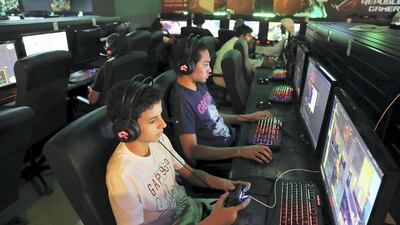A university in Dubai will this year begin offering a course that teaches students videogame development and digital animation to address the needs of the region's burgeoning gaming industry.
Starting in September, the University of Wollongong in Dubai will launch the four-year course in which students will learn about game design, animation, visual communications, mobile applications, journalism, graphic design and social media.
“We are trying to anticipate the kind of technical skills that students will require in the coming years and are planning for jobs that do not exist yet,” said Dr Feras Hamza, head of the School of Humanities, Social Sciences and Health.
"There was a gap in the market because there was no one offering creative specialisation in media. In gaming and digital animation, technology is moving fast."
The gaming industry in the Middle East is growing at a rate of 26 per cent each year, Suzy Pallet, vice president of Informa, which organised Middle East Games Con in Abu Dhabi in October, told The National last year.
She said that compared with about 3 per cent annual growth in more established regions such as Europe or the US, the Middle East was an "untapped opportunity".
Video games are expected to generate $262 million (Dh962m) in revenue in the region this year and show a 5.9 per cent year-on-year increase in gamers to 4.8 million players, a report by German online statistics portal Statista said.
The new course is designed to train students to tap into this growing market.
“We will be focusing on gaming because this is about making any kind of transaction more acceptable for the audience,” Dr Hamza said.
“We want to train our students on the latest technologies but we also want to train them to think for themselves and be innovative and creative.”
He said the course moved past traditional forms of media studies that were still being taught at other universities, despite being outgrown by other areas of media.
The Dubai university's president, Prof Mohamed Salem, said innovation was vital.
"As the world shifts away from more traditional media offerings towards a new digital landscape, it is important we introduce new programmes that support the needs of the region," he said.
Malek Teffaha, head of communication and localisation at Ubisoft Mena, said more universities needed to offer gaming degrees to keep up with industry demands.
"Potentially, there are jobs for graduates and this opens up opportunities for students to explore the field properly
. Right now, the biggest hurdle is there are not a lot of educational courses helping people tap into this field," he said.
The course is accredited by the Ministry of Education and students will have a choice of receiving their degree from either the University of Wollongong in Dubai or the University of Wollongong in Australia.


